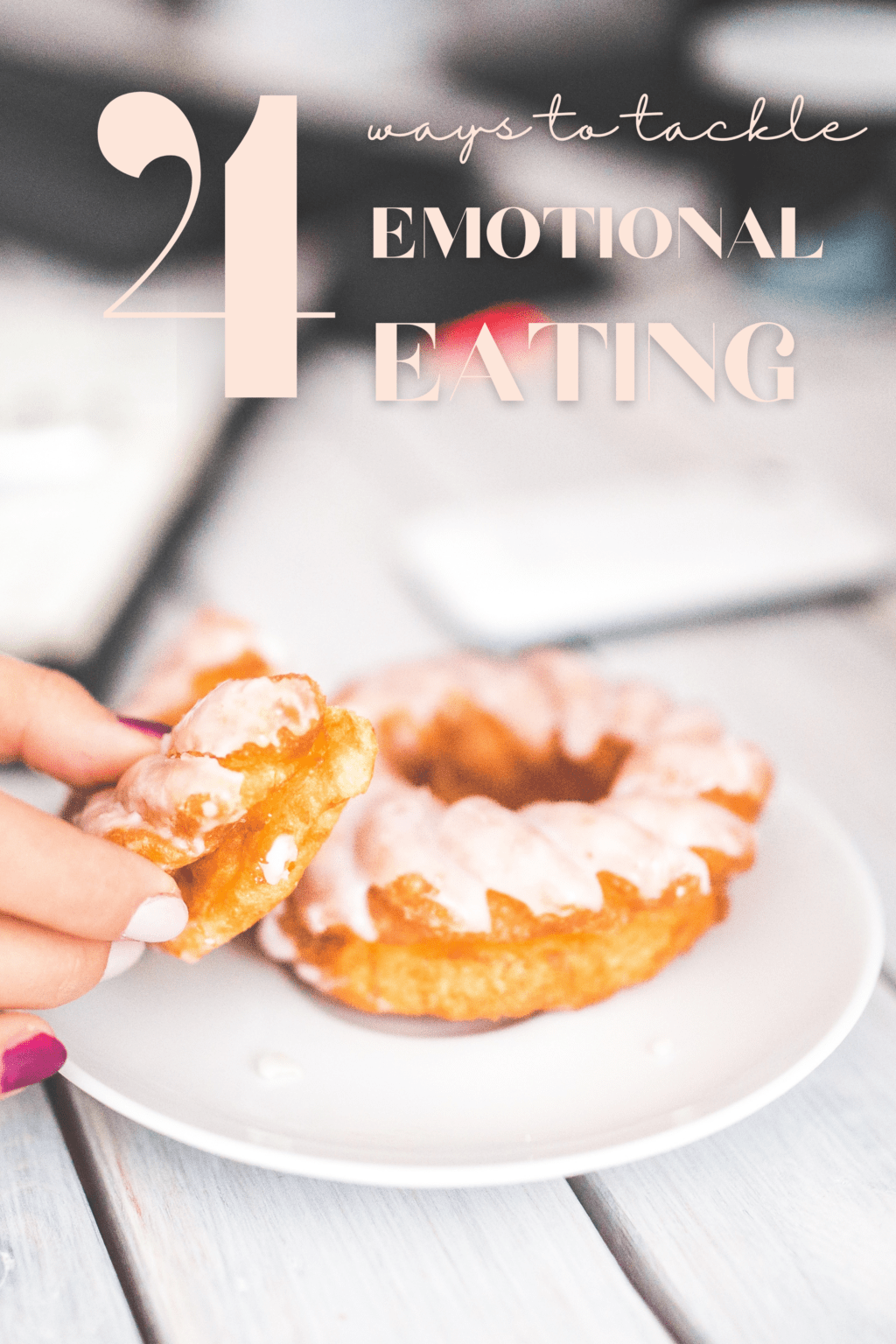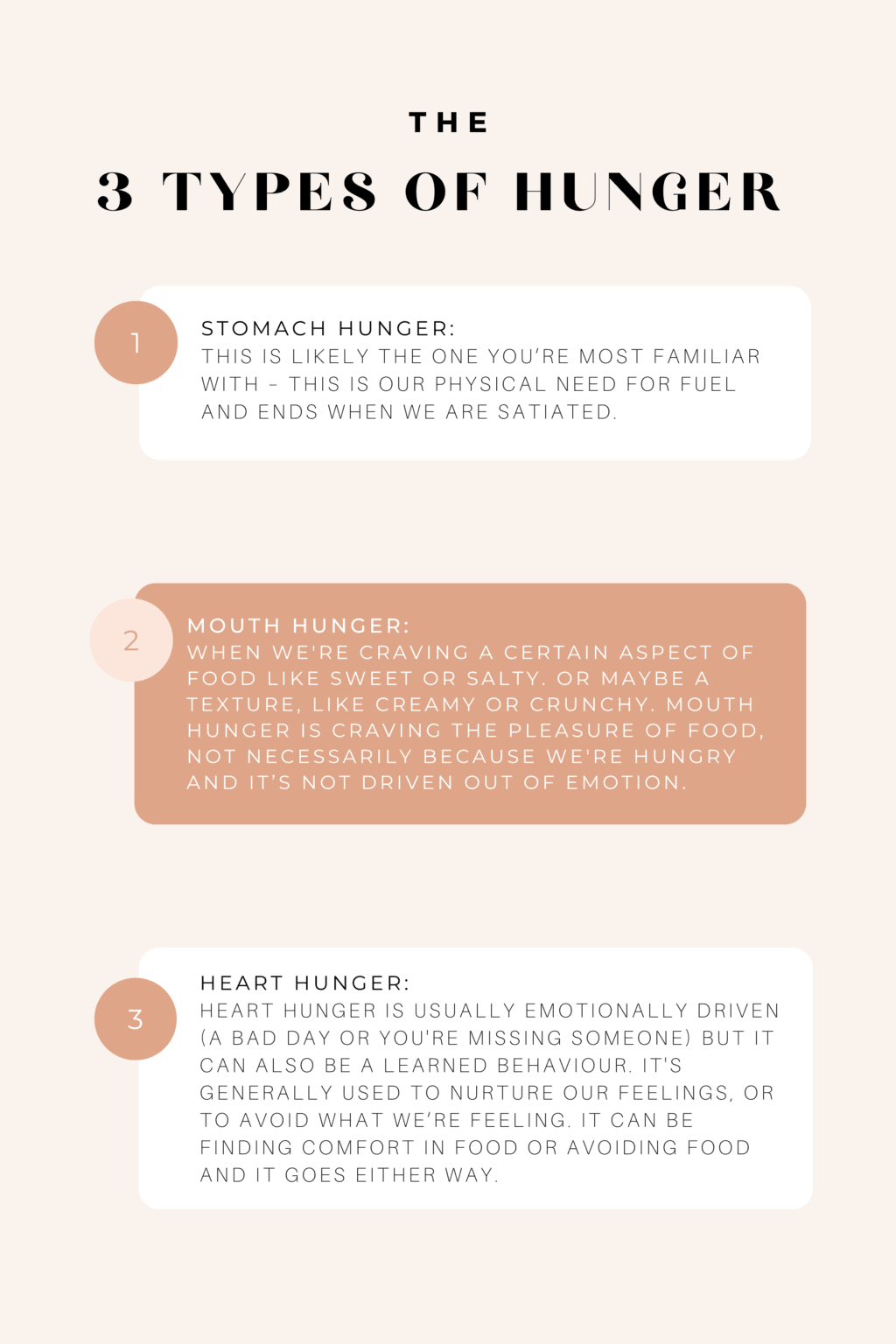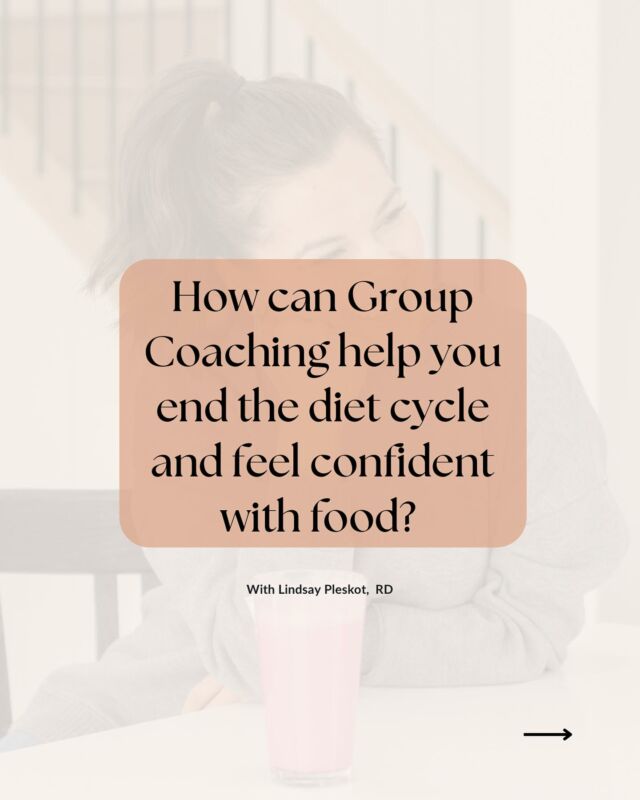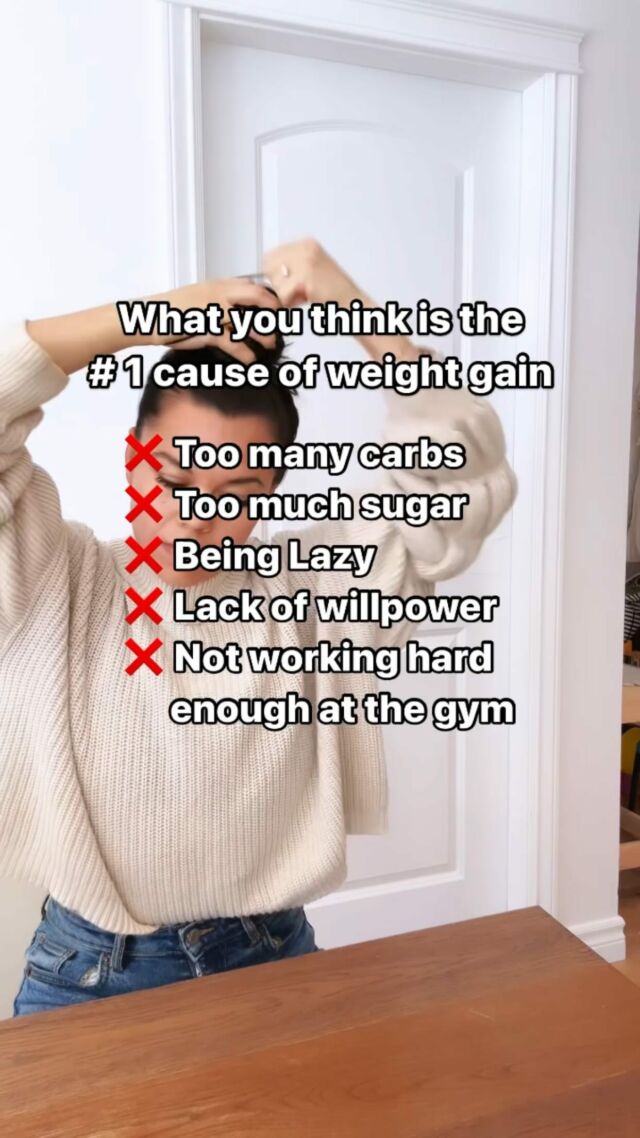Emotional eating… we’ve all been there. Whether it’s a pint of ice cream after a stressful day or a bag of chips after the kids go to bed, emotional eating can be a way to cope with life’s challenges. However, it can also leave us feeling chaotic, stuck, and out of control.
Today on the blog, our intuitive eating dietitian, Ally Choo, takes us on a deep dive into what emotional eating is, when emotional eating may be an issue, the difference between emotional hunger and other types of hunger (did you know there are different types?), the signs of emotional hunger, and 4 steps to address it!

Let’s face it, food is so much more than just fuel – having an emotional element to it is normal and actually one of the beauties of it. Across cultures, food has been used as a way to connect, celebrate, and comfort one another. However, frequently coping with our emotions with food, or having it be our only coping tool without uncovering what we are feeling and what we might actually need in that moment, can leave us feeling chaotic, stuck, and out of control.
If you’re feeling like you can’t stop “eating your feelings” and feel guilty after eating and don’t know what to do, don’t worry – we’ve got you. Today on the blog, we’ve got our intuitive eating dietitian, Ally Choo, taking over to go through:
- What is emotional eating?
- What’s the issue with emotional eating?
- The difference between emotional hunger and other types of hunger
- 4 signs of emotional hunger
- 4 strategies to stop emotional eating
So let’s dive in.
We’ll start off by answering a couple of common questions asked about emotional eating.
Emotional eating can leave us feeling chaotic, stuck, and out of control. Pulling in mindfulness, reflecting on what emotion you might be feeling, and what you really need in that moment might be a great place to start. Read more about how to address emotional eating here.
It might not always be obvious if you’re eating for emotional reasons. Some common signs of emotional eating are eating to numb feelings of discomfort, consistently eating past fullness, or frequently turning to food as a reward. Read on to learn about more signs you may be emotionally eating.
What is emotional eating?
We are all emotional beings, in fact it is the very thing that connects us, and it makes sense that emotions would play a role in our relationship to food. Emotional eating is when we eat for reasons other than physical nourishment and are tied to an emotional state. These emotions can be pleasant, like excitement or celebration, they can be neutral, like boredom or procrastination, or they may be unpleasant, like stress, anxiety, or loneliness. While some emotions may not feel good, all emotions exist to help inform us of how we truly feel about a situation and subsequently impact our behaviours.
Ready to Transform Your Relationship with Food?
Explore not just what you eat but why you eat, how you feel when you eat and any patterns that affect how you feel or impact any choices you make and start your journey to food freedom today!
What’s the issue with emotional eating?
While emotional eating is completely normal and can be one effective way to cope with emotions, it can become an issue when it’s your only coping mechanism. While food can provide short term relief or distraction, it doesn’t address the root cause of the emotion in the first place. In this way, it often leaves us feeling worse in the long run as not only will we have to deal with the source of the original emotion, we will also have to deal with the physical discomfort of eating in a way that doesn’t truly feel good and the emotional backlash that may ensue.
What is the difference between emotional hunger and other types of hunger?
Did you know that there are 3 Different Types of Hunger? This is a concept that was first introduced to us by a cognitive behavioural program called Craving Change.
What are the different types of hunger and how can we tell the difference between them?
- Stomach hunger (physical hunger) can be defined as a physical need for food. It tends to build slowly and increases the longer a meal is delayed. This type of hunger is satisfied by eating food.
- Mouth hunger can be defined as the type of hunger that is related to craving a particular aspect of a food or eating experience (ex. Popcorn at the movie theatre, sweetness of a cookie)
- Emotional or heart hunger can be defined as an urge to eat that is driven by emotions, not by a physical need for nourishment. This is often independent of when you last ate, can come on quickly or abruptly, and is generally not satisfied by eating food.

4 signs of emotional hunger
How can you tell if you’re experiencing emotional hunger? Here are 4 scenarios to watch out for:
- You’re consistently eating past pleasant fullness because the food is providing short term relief, comfort or joy, however causing physical discomfort in the long run. If you’re unsure what pleasant fullness feels like, using the hunger fullness scale can help to reconnect you with your body’s signals.
- You’re turning to food when you’re feeling bored. Learn more about how to stop eating when bored here (and also when it’s totally ok!).
- You’re frequently using food as a reward, regardless of how you’re feeling physically. Using food as a reward may be a learned behaviour depending on your family of origin.
- You’re using food to numb out or distract from unpleasant emotions like stress, loneliness, anxiety, or anger instead of allowing yourself to sit with these emotions and process through them.
When considering these scenarios, it can be helpful to ask yourself
‘What is the most loving thing I can do for myself at this moment?’
It may in fact be using food to cope or it may be using another tool in your toolbox (more on that below). Applying mindfulness and honing in on your intention can help to give yourself the permission and freedom you need to take care of yourself in a truly loving way in that moment.
4 strategies to stop emotional eating
When addressing emotional eating, it’s not about demonizing eating for emotional reasons or avoiding it altogether, it’s about bringing in mindfulness to determine what will holistically serve your needs best in that moment. By learning to create space between our triggers and our actions, we can truly learn how to how to stop feeling guilty after eating for good.
So what can you do?
1. Bring in mindfulness
Mindfulness is simply, awareness without judgement. One tool to start exploring what hunger you might be feeling is to do a body scan.
- Starting with a physical scan, move from your head to your toes and see if you may be feeling any signs of physical hunger (grumbling stomach, tiredness or lethargy, difficulty concentrating) .
- Next, do a mental/emotional scan, make note of what thoughts or feelings you may be experiencing in that moment (are you sad or anxious? Did you just have an argument with a loved one?).
Another tool we often use with our Make Food Feel Good community is a mindful food journal. Reflecting on not just what we eat, but why and how we eat, can help us to see patterns in our eating decisions. This can help us shift from acting on autopilot to becoming conscious of our actions and how they
impact how we feel day to day. This self awareness ultimately serves as the basis for long term behaviour change, since once you see it, you can’t unsee it.
2. Consider what might be lacking in your self care
Often when our life balance is off kilter, our emotional resiliency can waiver. This can lead to leaning heavily on our immediate coping skills (like turning to food) when we are not feeling supported. Consider where in your life you might be out of balance, including physical nourishment, pleasurable joys, social connection, and emotional well being.
3. Learn to Cope with Your Emotions with Kindness
Coping with your emotions with kindness is one of the 10 Principles of Intuitive Eating. This principle focuses on identifying what emotion we’re feeling and determining what we actually need in that moment to cope with that emotion.
One way to do this is to ask yourself ‘What am I feeling right now?’ Sometimes it can be hard to pinpoint an emotion beyond happy, sad, or mad, so it can be helpful to use a word wheel to help you determine what you might be feeling. If you’re still not sure, using a descriptor like ‘uncomfortable’ can be used instead.
Next, ask yourself ‘what do I really need right now?’ If you’re feeling sad, you actually may need comfort or support from a friend. If you’re feeling fear, you may actually need reassurance and or a way to increase your sense of safety. Finding ways to meet your emotional needs can help to process your emotions and provide relief long term.
One tool we often use with our clients is creating a nurture menu. This is a menu of ways you can nurture yourself without food and can include activities like journaling in a gratitude journal, going for a walk outside, or calling a friend.
If you’re struggling with uncovering your emotions, counseling from a registered dietitian or trusted healthcare professional can help.
4. Balance your blood sugars with consistent, adequate nutrition
Unstable blood sugars are linked with increased levels of our stress hormone, cortisol. Stabilizing our blood sugars helps to improve our emotional regulation and may help with practicing mindful eating. If you’re not sure where to start, here are 15+ well balanced meal ideas and 10 healthy eating habits from a registered dietitian.
Ready to Transform Your Relationship with Food?
Explore not just what you eat but why you eat, how you feel when you eat and any patterns that affect how you feel or impact any choices you make and start your journey to food freedom today!
Now over to you
- Did you know there were 3 types of hunger? Which hunger do you notice the most?
- Have you ever used a word wheel?
Share with us in the comments below or take a screenshot and share it with us over on Instagram! And if you found this post helpful, pass it along to a friend or family member who could benefit from it too!
Looking for more support?
If you’re looking for guidance on where to start with healing your relationship to food, fostering trust within yourself and your body, and building confidence in your everyday eating, we’d love to support you! Book in for an initial assessment to get started.









Leave a Comment & Rate this Recipe